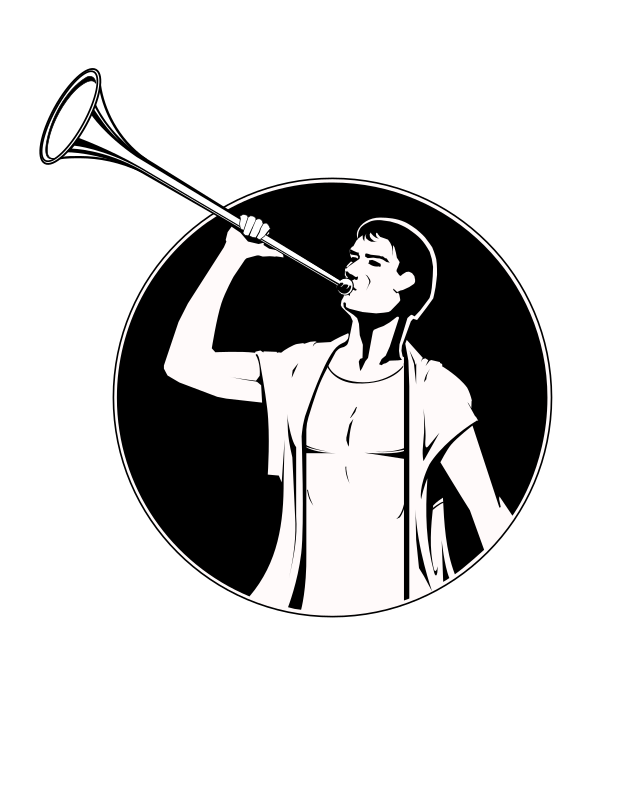Nearly
every student had come to the High School that day dressed in their Sunday
best. What appeared to be a religious gathering held a much different meaning
on this day; the air was heavy and somber. The clock ticked softly in the
corner of the room as I waited for the bell. We sat in those faded orange
chairs that echoed the great school spirit associated with the tradition of
school colors. In the background the professor continued the lecture but all
eyes pointed downward. Lost in thought, we all contemplated what had transpired
the day before. A girl’s whimper and the sound of tears broke from the row of
desks to my right. She had known her. They had been best friends before it had
happened— before the accidental shooting.
The
bell rang and we all stood up and grabbed our things. Walking down the hallway,
all was silent. It was an eerie silence that I had never before experienced. I
went down and grabbed my French Horn as the rest of the band quickly rushed to
the main lobby of the school where we would be performing in tribute of the
life the girl who had been shot.
 |
| Photo from: i.telegraph.co.uk |
We
felt like an army marching to help our fallen friend. We had a duty that no one was taking lightly. Our instruments were swords; our music,
shields. I wonder if the 2,000 young warriors in the Book of Mormon had felt
the same sense of comradery and duty as they marched to help their brothers in
war.
Or
perhaps the people of Nephi who were committed to defending their friends who
had promised to never fight again.
We
sat together and prepared ourselves. The song was Danny
Boy. It had a beautiful lyrical line and a french horn solo that expressed the
feelings of the day perfectly.
We
sat there in the uncomfy chairs of the hall surrounded by many students all
dressed in their suits and dresses, all wanting to honor the girl who had died.
Some knew her, many did not, but all wanted to respect her and the
manifestation of this was huge. There is something about tragedy that brings
out community. It is a beautiful thing. It is sad that an ugly thing must bring
out beauty in life
Every High School student was affected. The girl had been shot
in the head by a gun the kids thought was not loaded. Those who knew her were
heartbroken. Even those who didn't know her were affected. The whole school was
somber. The Symphonic Band was asked to play as tribute. Many students had come
dressed in their Sunday best. I played the French Horn in the band. Each
musician played their heart out. We played for her. Students surrounded the
band in the large entryway. The air seemed think and tears streamed down faces.
The power of music said what everyone was already feeling. And yet, it healed.
For
those of us in the band, the opportunity to perform was an incredible
experience. It was transcendent and lead to a clairvoyance that allowed us to
see into the life beyond the here and now. We played our hearts out for that
girl. We didn't even know her, at least not personally. But there we sat in our
Sunday best and we gave it our all. We played for her. We all played for her.
Everyone in the school did it for her. Life is so short and I think that is why
it scared us. But it is those moments when we are scared that we cling to
something stronger and those things we cling to, if but for a moment, will
bridge that gap between heaven and earth. That is what music did for us on that
day. It was the bridge that brought us all together and brought us strength. It
is one memory that I will never forget.
Later
that day I was walking home. To get home I have to climb a very steep hill.
There are very few trees on that hill; only dirt and some scrap from cars that
fling them to the sides of the road as they speed along. You have to walk on
the curb in order to avoid the dangerous vehicles that careen through the loopy
road leading up to my house. I realized that this road is representative of
life. Understand that if men are that we are to have joy, then the purpose of
our very existence is to come to find strength and happiness. So why is there
struggle? Well what I realized is there is happiness at every step of the
journey. Sometimes it’s harder to find. Sometimes there are no trees. But in
the end, there is a road that leads back home— and we are on it.
-------------------------------------------------------------------
What Brings Us Together
Nearly every student had
come to the High School that day dressed in their Sunday best. What appeared to
be a religious gathering held a much different meaning on this day; the air was
heavy and somber. The clock ticked softly in the corner of the room as I waited
for the bell. We sat in those faded orange chairs that echoed the great school
spirit associated with the tradition of school colors. In the background the
professor continued the lecture but all eyes pointed downward. Lost in thought,
we all contemplated what had transpired the day before. A girl’s whimper and
the sound of tears broke from the row of desks to my right. She had known her.
They had been best friends before it had happened— before the accidental
shooting.
The bell rang and we all
stood up and grabbed our things. Walking down the hallway, all was silent. It
was an eerie silence that I had never before experienced. The band had been
asked to perform in tribute of the girl who had been shot. I went down and
grabbed my French Horn and followed the rest of the band to the atrium.
We felt like an army
marching to help our fallen friend. We had a duty that no one was taking
lightly. Our instruments were swords; our music, shields. I wonder if the 2,000
young warriors in the Book of Mormon had felt the same sense of comradery and
duty as they marched to help their brothers in war; or perhaps the people of
Nephi who were committed to defending their friends that could not defend themselves.
Did they feel that same sense of duty, love, and determination?
As we neared the atrium, unexpected things began to
happen. The buzz of students talking in the nearby cafeteria and adjacent halls
softened to a murmur; as we took our seats I glanced down at the music stand in
front of me. As I contemplated the song we were about to perform, I realized
that the dots on that page meant much more to me than just notes. That day they
represented our whole hearts. It was to represent the life of our fellow
student. Her hopes, her dreams, her accomplishments. We would perform for her.
I looked up and was amazed to see a very large
number of students now standing around the band. The great throng of students
was respectfully silent now, waiting for us. I looked in front of me and up
towards our director. I noticed that even Matt who was normally somewhat of a
rambunctious kid had sat up straight in his seat, instrument held at the ready.
For any other performance he would have been leaning forward and poking the
girls who play clarinet. I guess some people have a strange way of flirting.
But this wasn’t any old concert. The atrium and
surrounding hallways were filled with students who had all come to remember our
friend. I had seen nothing like it before.
The director made a motion. We lifted our
instruments and began to play. The melody was a very lyrical, beautiful line.
We played that part with as much expression as we could. The tubas and
trombones, they gave core to the song as the melody transitioned from
instrument to instrument. You could feel the unique emotion that each sound
gave. Many different instruments. Many different sounds. Many different people.
But we were united as one voice; everyone felt it. The whole school was united.
We stood together in memory of her.
The final notes echoed through the school, leaving
the air heavy. The silence was thick. As I let myself come back to my
surroundings, I heard sniffling from the crowd. What had they felt as we had
performed?
The things that bring us together are the things
that give us strength. They are things that are bigger than the one; bigger
than the individual. That day, that thing had been music. It united us in
spirit, in voice, and it gave us strength amidst tragedy.
It has been said that music is the bridge between
Heaven and Earth. Nothing was further than the truth on that one day when we
were all brought together, unified by music.






.png)





